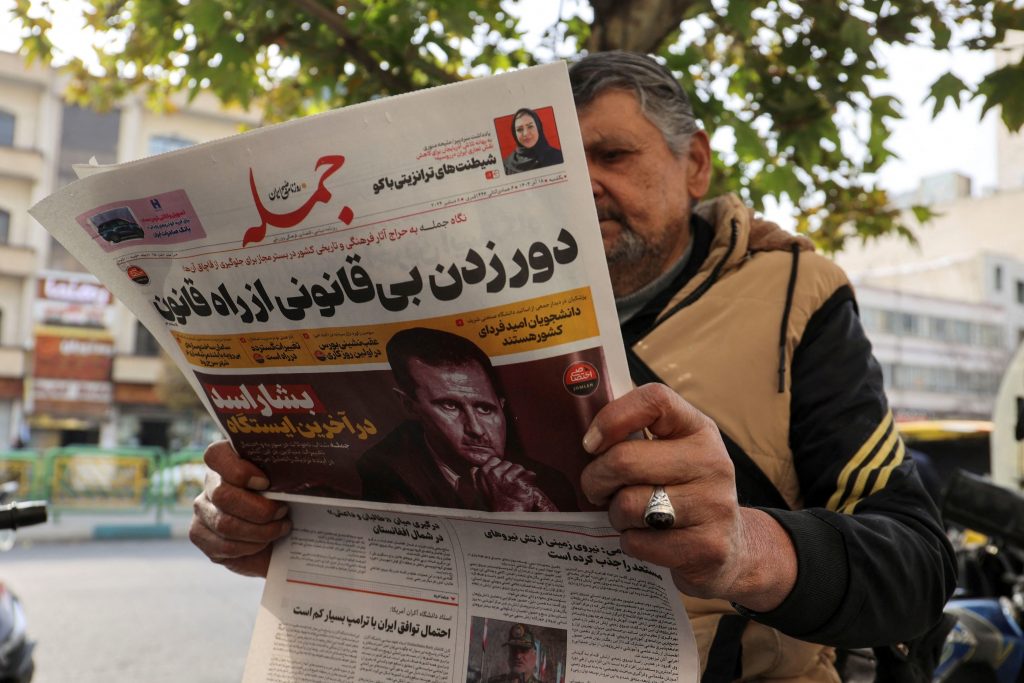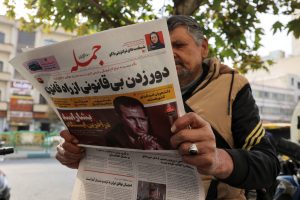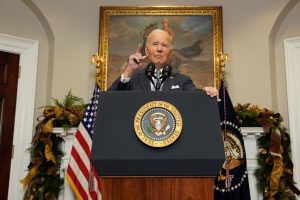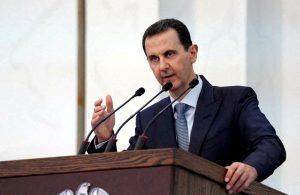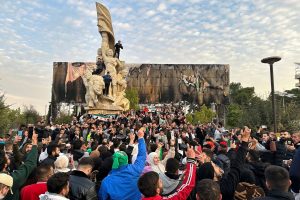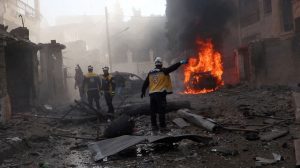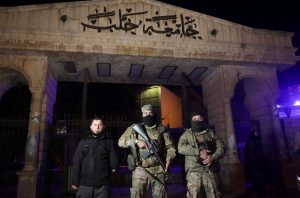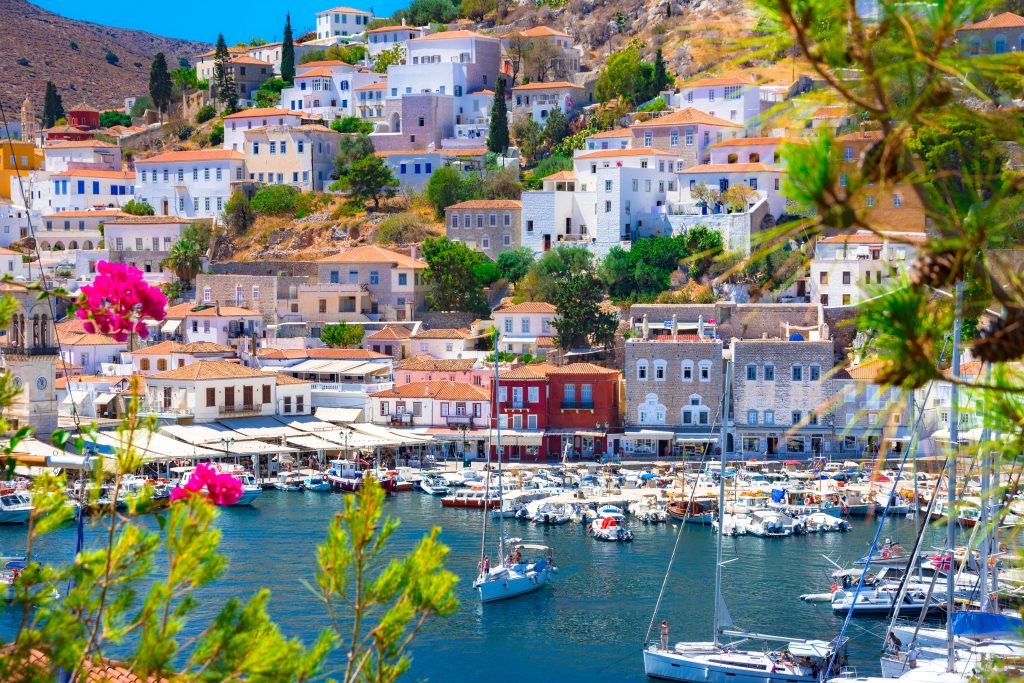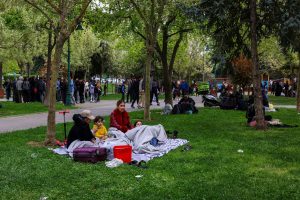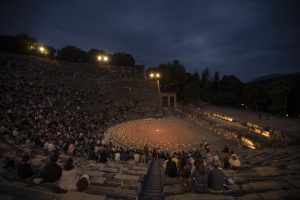DAMASCUS, Syria—Rebel fighters and civilians strolled through the grounds of Bashar al-Assad’s presidential palace on Tuesday, stepping on shredded posters of the former dictator who had fled to Russia days earlier.
In Assad’s abandoned office, his desk and floor were littered with books and papers: a history of the Russian military, a map of northeastern Syria, a biography of himself. Strips of benzodiazepine antianxiety pills were in their packaging on the desk.
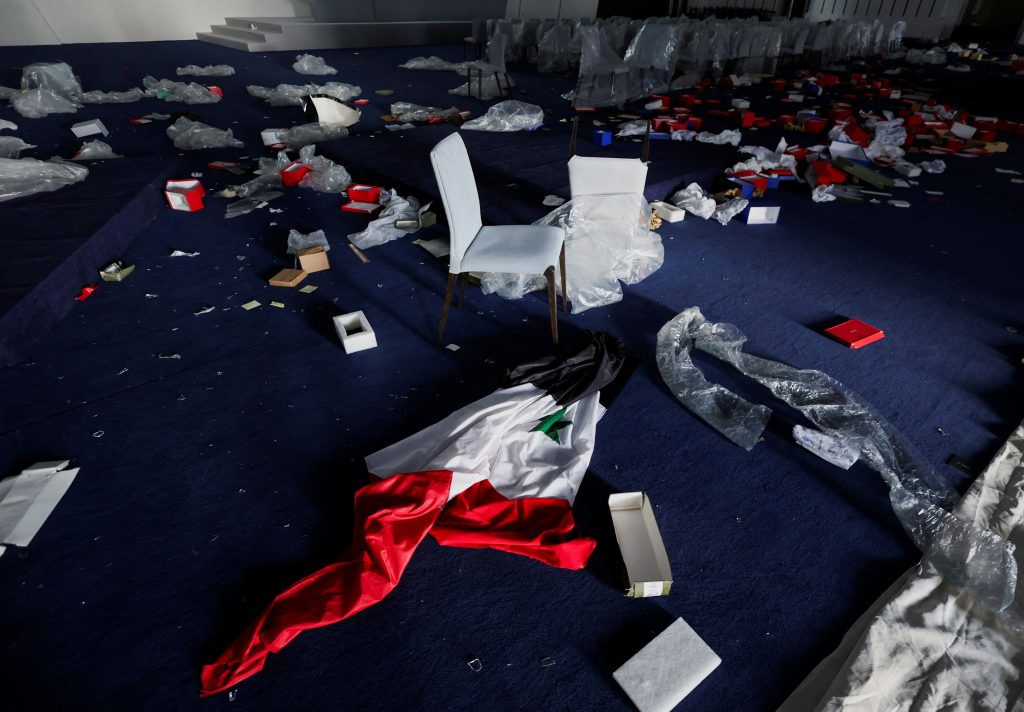
A view of a Syrian flag around a damaged conference hall in the Presidential Palace known as Qasr al-Shaab “People’s Palace”, after rebels seized the capital and ousted Syria’s Bashar al-Assad, in Damascus, Syria December 10, 2024. REUTERS/Amr Abdallah Dalsh TPX IMAGES OF THE DAY
On one of the yellowed windows overlooking Damascus, someone had spray-painted, “God damn your soul, Hafez,” a reference to Bashar’s late father, Hafez al-Assad, who ruled Syria for some three decades before his son inherited power.
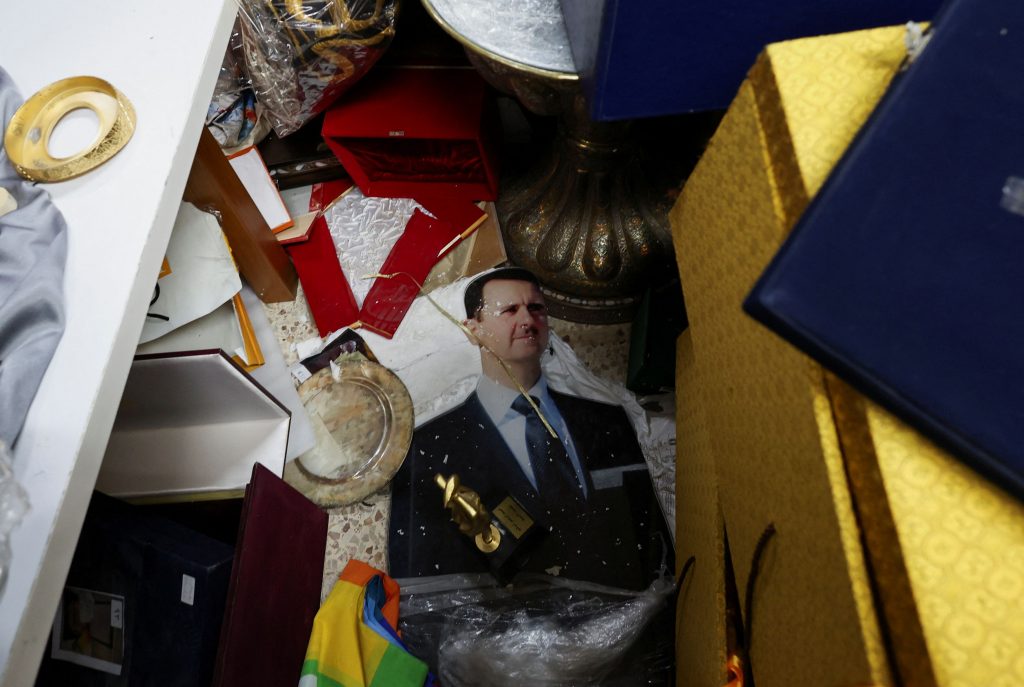
A view of personal souvenirs for Syria’s Bashar al-Assad at one of the rooms at Presidential Palace known as Qasr al-Shaab “People’s Palace”, after rebels seized the capital and ousted Syria’s Bashar al-Assad, in Damascus, Syria December 10, 2024. REUTERS/Amr Abdallah Dalsh
The palace afforded a glimpse into the last days of a dictator who for more than a decade used torture, bombings and chemical weapons in a war to suppress a rebellion against him, which began during the Arab Spring protests in 2011.
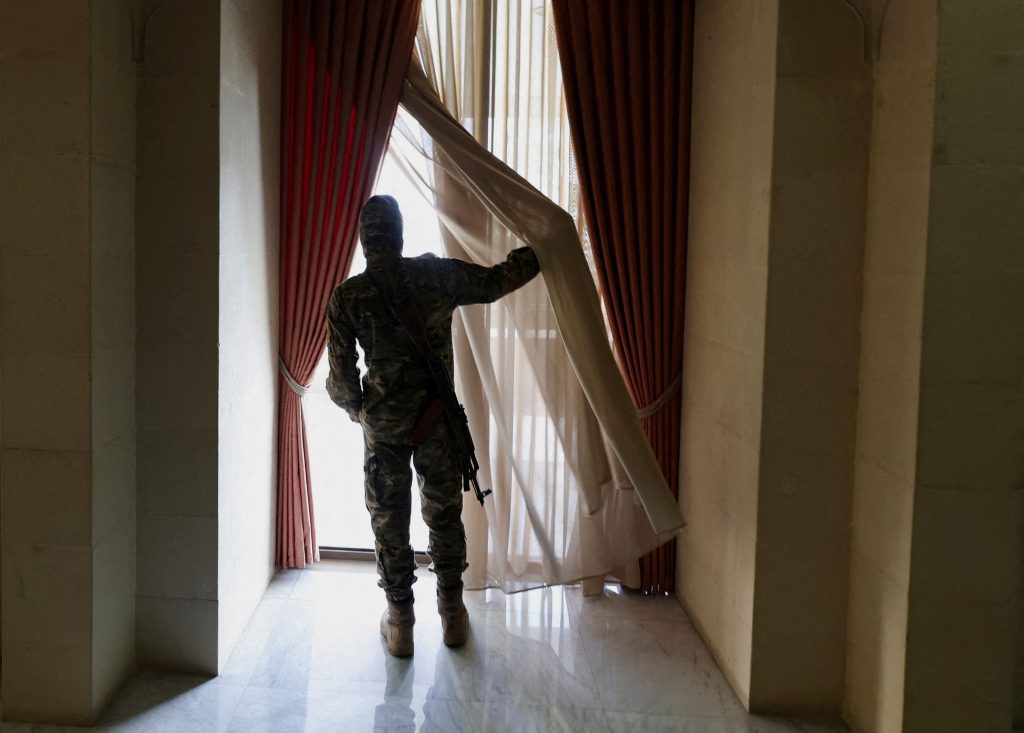
A rebel fighter looks through a window inside the welcoming hall in the Presidential Palace known as Qasr al-Shaab “People’s Palace”, after rebels seized the capital and ousted Syria’s Bashar al-Assad, in Damascus, Syria December 10, 2024. REUTERS/Amr Abdallah Dalsh TPX IMAGES OF THE DAY
In recent days, demonstrators have swarmed into Umayyad Square in the center of the capital, posing with rebel fighters holding assault rifles and waving the green, white and black flag of the Syrian revolution.
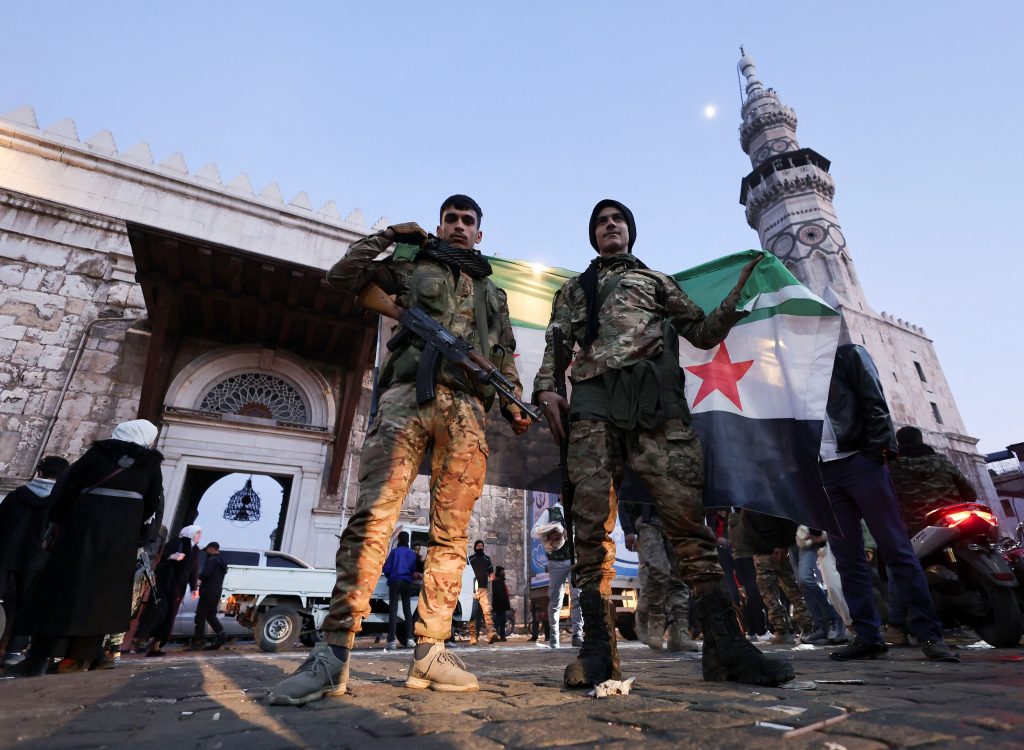
Rebel fighters pose as they hold a Syrian opposition flag at the Umayyad Mosque, after rebels seized the capital and ousted Syria’s Bashar al-Assad, in Damascus, Syria December 9, 2024. REUTERS/Amr Abdallah Dalsh
After a yearslong civil war, the regime crumbled in less than two weeks as its allies, Russia and Iran, weren’t able to help it stop a rebel advance. Rebels aligned with the Islamist group Hayat Tahrir al-Sham, also known as HTS, seized a series of Syrian cities, paving the way for an almost frictionless takeover of the capital Sunday.
On Tuesday, in the entry hall to the wing of the palace housing Assad’s office, a rebel soldier with an AK-47 slung over his shoulder, meandered with two comrades down a strip of red carpet that bisects a vast marble floor.
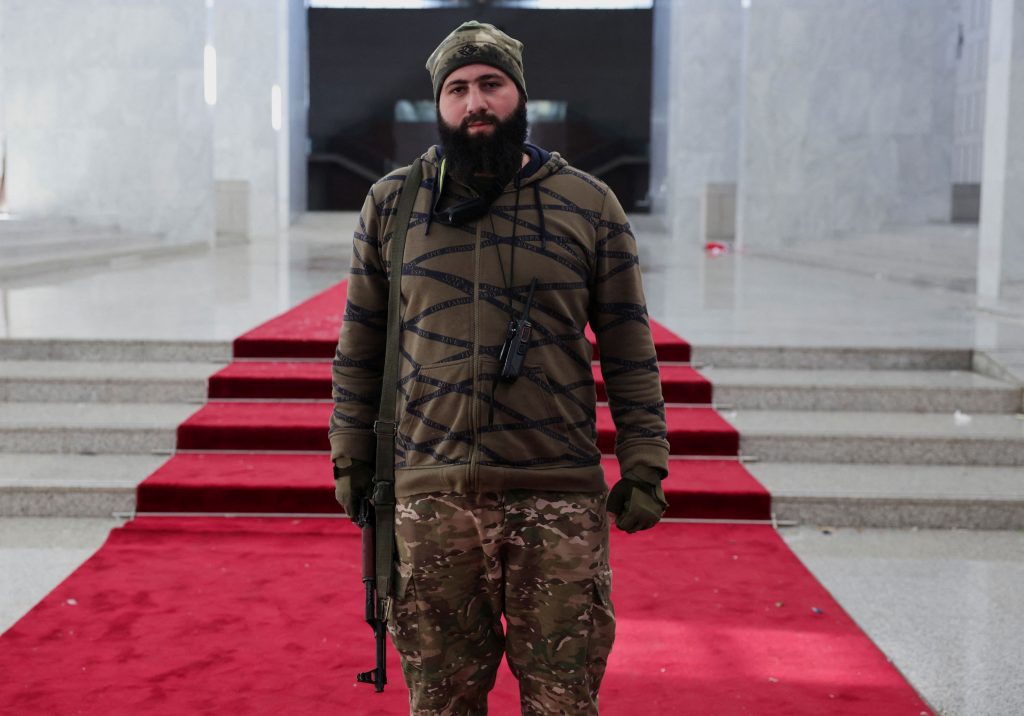
Abu Mussab al-Halabi, a rebel fighter poses for a photograph after an interview with Reuters TV inside the welcoming hall in Presidential Palace known as Qasr al-Shaab “People’s Palace”, after rebels seized the capital and ousted Syria’s Bashar al-Assad, in Damascus, Syria December 10, 2024. REUTERS/Amr Abdallah Dalsh
“The nightmare is over,” said the soldier, Mustafa Hassan, a former history teacher from the Syrian city of Raqqa who joined the 2011 protests and took up arms in the rebellion. He was later imprisoned by Islamic State when the extremist group took over the city.
“We’re done with one battle, and we’re beginning another: a battle of building and developing relations with other countries,” said Hassan.
The now-emptied presidential palace, perched on a hilltop next to Damascus, remains as a monument to a vanquished regime. Designed by a Japanese architect and completed in 1990 under the rule of Assad’s father, the building is a relic of authoritarian architecture, with vast cuboid halls.
The palace has at least two rooms for cabinet meetings: one above ground and one underground. The subterranean room is part of a bunker that appeared to be built for a last stand.
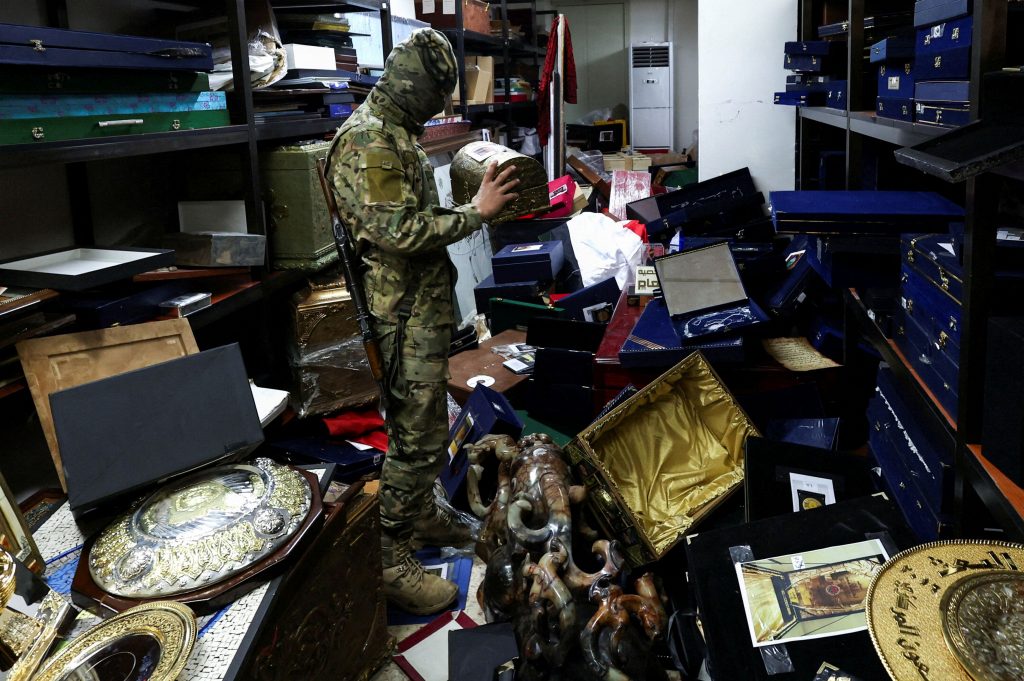
A rebel fighter holds and looks at personal souvenirs of Syria’s Bashar al-Assad at one of the rooms at Presidential Palace known as Qasr al-Shaab “People’s Palace”, after rebels seized the capital and ousted Syria’s Bashar al-Assad, in Damascus, Syria December 10, 2024. REUTERS/Amr Abdallah Dalsh TPX IMAGES OF THE DAY
In the cabinet room, three stories beneath the palace in Syria’s Mount Qasioun, brass plates label the seats for the defense minister and various military commanders. At the head of the table, Assad’s place is marked: The Commander in Chief. The room is connected to underground living quarters, with a bedroom and bathroom, as well as accommodations for staff.
HTS fighters secured the palace after crowds of euphoric Syrians stormed into the complex on Sunday, carting away furniture and artwork. Some took videos of themselves as they stumbled into a garage full of sports cars, including Aston Martins and a Lamborghini.
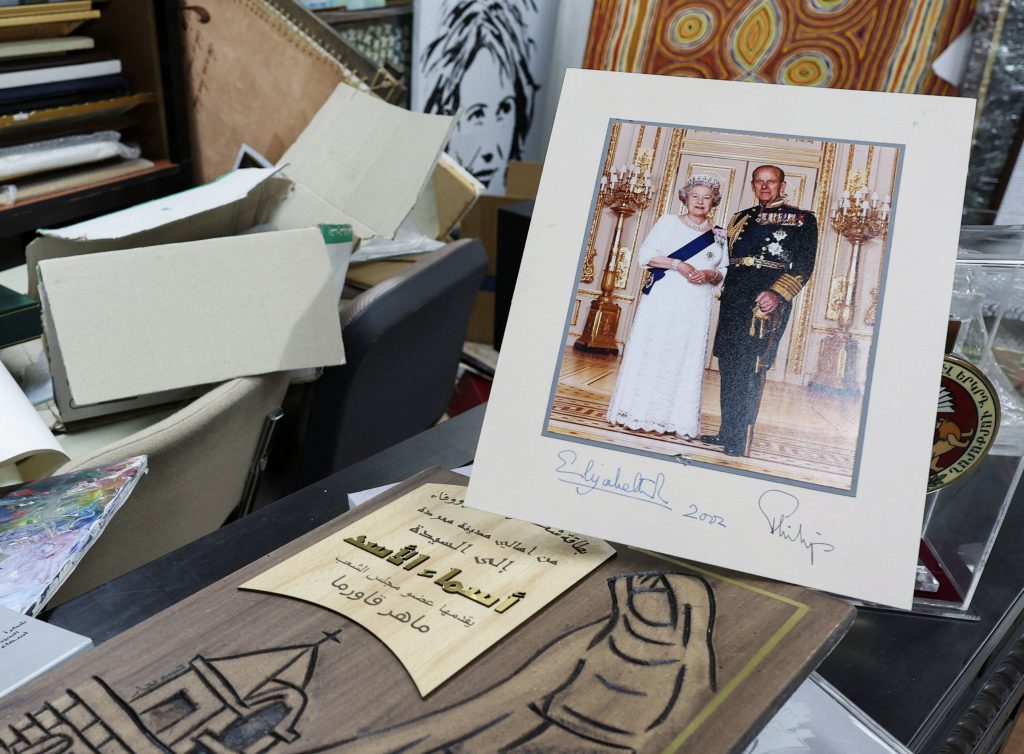
A view of personal souvenirs for Syria’s Bashar al-Assad at one of the rooms at Presidential Palace known as Qasr al-Shaab “People’s Palace”, after rebels seized the capital and ousted Syria’s Bashar al-Assad, in Damascus, Syria December 10, 2024. REUTERS/Amr Abdallah Dalsh
The calm at the palace on Tuesday was part of a broader effort by HTS to avoid chaos during the transition to a new government. The rebels have sought to preserve many government institutions and keep some former regime police in place.
The rebel victory has the potential to alter the global balance of power, dealing a stinging defeat to Russia , which launched a punishing campaign of airstrikes in 2015 that helped push back rebel advances and rescue Assad’s regime from collapse. The opposition takeover also rolls back Iran’s footprint in the Middle East, cutting Tehran off from areas near its rival Israel and severing key supply routes to allied militias such as Hezbollah.
Assad’s defeat came when his allies were distracted with other troubles. Russia is mired in its full-scale invasion of Ukraine, while Iran has been bruised from Israel’s military offensive this year against Hezbollah, which intervened in the war on the side of the Assad regime.
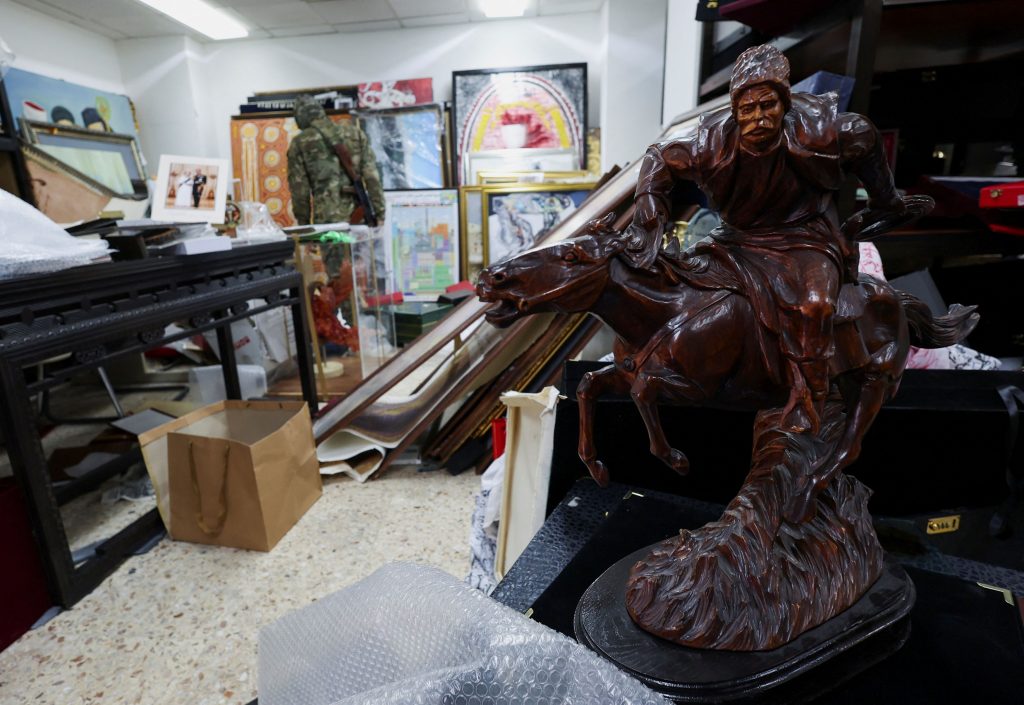
A view of personal souvenirs for Syria’s Bashar al-Assad at one of the rooms at Presidential Palace known as Qasr al-Shaab “People’s Palace”, after rebels seized the capital and ousted Syria’s Bashar al-Assad, in Damascus, Syria December 10, 2024. REUTERS/Amr Abdallah Dalsh
There are already signs of the uncertain future that lies ahead. Israel said it moved its troops into a buffer zone next to the Israeli-annexed Golan Heights and carried out airstrikes on Syrian military assets. The North Atlantic Treaty Organization member Turkey is increasing pressure on Kurdish militants it views as terrorists, some of whom are allied with the U.S., pursuing a longtime political and military goal that puts it at odds with Washington.
A debate is beginning abroad about how to handle HTS, a U.S.- and U.N.-designated terrorist group that was once an ally of al Qaeda. The organization’s leader, Abu Mohammed al-Jawlani, has said he has given up extremism, and the group has articulated a vision for protecting minorities in Syria under its rule. The Biden administration has kept its distance from HTS, though some Western diplomats have argued that it should be stripped of its terrorist label.
In Damascus, distant explosions and celebratory gunfire could be heard. The ruins of military vehicles lay on the highway between Beirut and Damascus, some still smoldering.
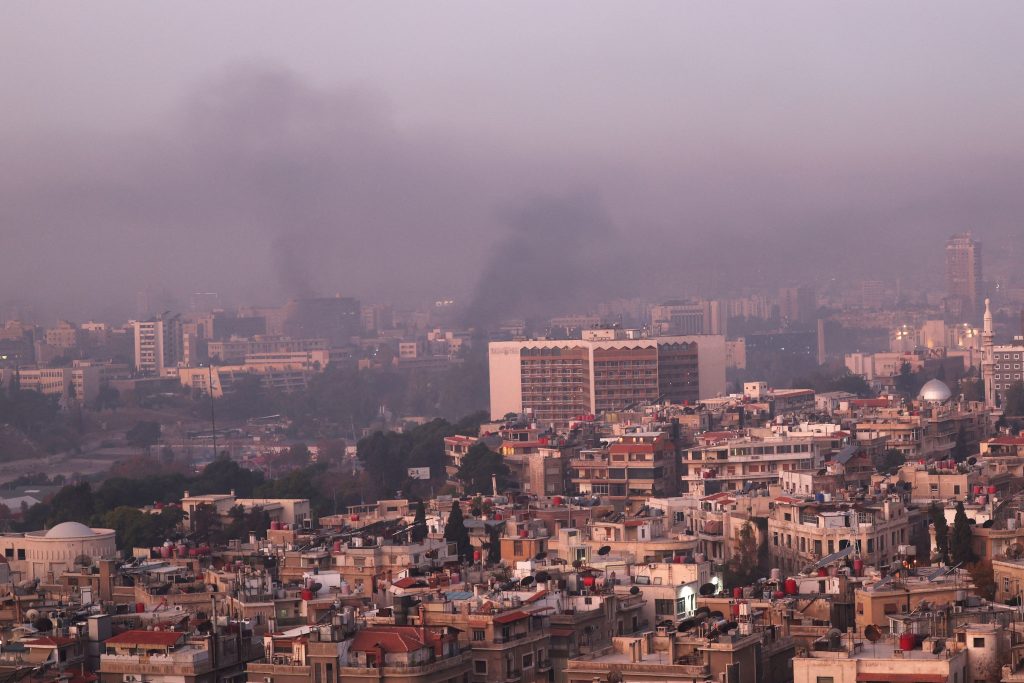
Smoke rises, after Syrian rebels announced that they have ousted Syria’s Bashar al-Assad, in Damascus, Syria, December 9, 2024. REUTERS/Amr Abdallah Dalsh
Elsewhere along the road were signs of the lightning rebel attack that seized the capital. On the edge of Damascus, an abandoned Assad regime troop carrier stood on the side of the highway, its windows pierced by bullets. In the street lay a pile of army uniforms, evidence of how many government soldiers simply gave up in the final hours and days of the rebel advance.
Throughout the capital in recent days, Syrians tore Assad’s face off posters of the former leader. They toppled statues of his father across the country. They tore down the red, black and white flag of the regime, replacing it with the rebel banner.
Youssef al-Masri, a 54-year-old Islamic scholar from Damascus, was beaming when he stood on the edge of Umayyad Square on Tuesday. He had been shot in the chest, he said, during the initial uprising against Assad and traveled abroad for surgery. He later returned to the capital and remained there, he said, waiting for Assad’s fall throughout the war. He had brought his daughters to join the celebration of the dictatorship’s collapse.
“There are no words in Arabic or in any language to express the joy that is in our hearts after the end of 45 years of repression,” he said. “Today, we breathe.”
Write to Jared Malsin at jared.malsin@wsj.com
